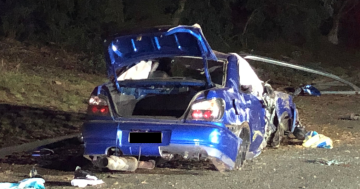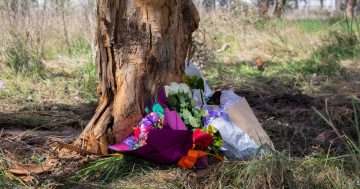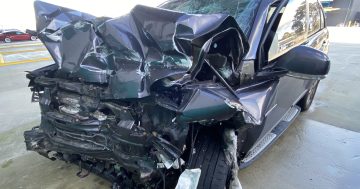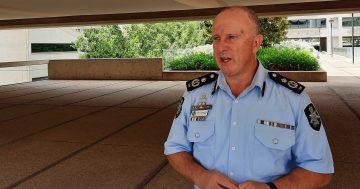
Scenes like this head-on crash on Hindmarsh Drive which killed Matthew McLuckie prompted the Assembly inquiry. Photo: ACT Policing.
Dangerous drivers know that they have a free run for their hooning and street racing on Weston Creek roads, according to the local community council.
In its submission to the Legislative Assembly’s dangerous driving inquiry, Weston Creek Community Council says the community has lost confidence in the police to maintain their safety after years of complaints going unanswered.
“The level of visible police traffic enforcement activity in the Weston Creek area is clearly inadequate, and as a result those people inclined towards dangerous driving activity regard Weston Creek roads as pretty much an enforcement-free zone,” the submission says.
The council says reports to the police contact number have gone unanswered, the online reporting system is not up to the task, being unable to load short videos of incidents, and police fail to show when an incident is reported.
“These ongoing scenarios severely undermine community confidence about their safety,” the submission says.
The council urges the ACT Government to direct ACT Policing to increase patrol presence in the area, ensure incidents can be reported by phone, the police website be updated, and for the Police Minister Mick Gentleman to meet with the community.
It backs ACT Policing’s current Operation TORIC but laments the time taken for it to be established.
The council stops short of supporting calls for a wholesale review of sentencing but believes prison should be reserved for the most egregious offences and sentence reductions should be limited to extreme and extenuating circumstances.
But it does call for a review of fines and for offenders’ vehicles to be confiscated and either sold, with proceeds going to a charity that assists victims and/or surviving families of road trauma, or crushed for recycling.
Penalties also need to be buttressed by better administration of the driver licensing scheme, including compulsory on-the-spot licence cancellation for serious offences.
The submission says the Vision Zero road safety campaign has failed because of an over-reliance on technology such as speed and red light cameras, and not enough focus on driver skills and attitude.
It says the current rehabilitation and driver re-education programs have limited effectiveness in reducing recidivism, and calls on the Government to engage a qualified expert to examine any such schemes in other jurisdictions and design a best practice model suited to the ACT.
The council believes innovative measures should be explored, including the use of police drones to track suspected offenders and intercept them, reducing the need for pursuits.
It suggests drivers not authorised or qualified to operate a vehicle could be locked out electronically, particularly with the new generations of smart cars.
The council also urges more financial and psychological support for road trauma victims through the Motor Accident Insurance Scheme.
The Standing Committee on Justice and Community Safety is examining dangerous-driving responses, including from police, the criminal justice system, penalties and the corrections system.
Tom McLuckie, whose 20-year-old son Matthew died in a head-on crash on Hindmarsh Drive in May, has also been leading a campaign for a review of bail and sentencing standards, with a petition attracting strong support.
“Leniency in sentencing has been an issue in Canberra for a long time and the minimal deterrent for serious motor vehicle crime, the revolving door of repeat offenders playing the system, is part of why we are looking at the inquiry now,” he said when the inquiry was announced.
“We need to treat the revolving door and apply appropriate deterrents and penalties … our sentencing, education, corrective services and rehabilitation are all in the mix.”
Submissions closed on 30 September.





















